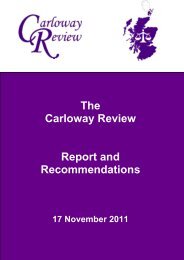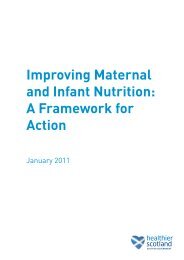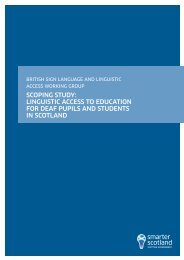Children's Needs â Parenting Capacity - Digital Education Resource ...
Children's Needs â Parenting Capacity - Digital Education Resource ...
Children's Needs â Parenting Capacity - Digital Education Resource ...
Create successful ePaper yourself
Turn your PDF publications into a flip-book with our unique Google optimized e-Paper software.
76 Children’s <strong>Needs</strong> – <strong>Parenting</strong> <strong>Capacity</strong>use or domestic violence on parents’ consciousness and energy levels can result inthe living space being littered with food scraps, or heavily polluted with human oranimal faeces. Such circumstances can pose serious risks to children’s health. ‘It wasreported by the health visitor that the house was incredibly dirty, including dog dirt in anumber of the rooms. The family also have quite large snakes in the front room, kept ina box’ (social worker discussing a family where both parents had a learning disability,quoted in Cleaver and Nicholson 2007, p.99). Excessive alcohol or illicit drug usemay also mean drugs and used needles and syringes are easily accessible to the child,and a lack of supervision may result in experimentation.Such negative scenarios are not inevitable. Some families where there are mentalhealth problems, learning disability, excessive alcohol and illicit drug use or domesticviolence ensure the children are looked after, clean and fed and have all their needsmet (Brisby et al. 1997). Parents may make adequate provision for their childrenand thus ensure that they are not exposed to environmental dangers. For example,parental forethought can ensure adequate substitute child care arrangements sothat children are not privy to drinking binges or drug misuse. Careful attention tostorage means that unsafe substances or equipment are not accessible to children.In fact local initiatives have been developed to keep children safe. For example, theNottingham Crime and Drugs Partnership (www.nottinghamcdp.com) fund theprovision of lockable storage boxes to give to drug users who are parents. Theseboxes can be used for medicine storage as well as for drug-using paraphernalia suchas needles and syringes.In addition, a caring partner, spouse or relative, particularly the children’sgrandparents, can make sure that essential household services are intact, check thatthe home is sanitary and safe for the child, act as an agent of social control or providea safe refuge for children (Cox et al. 2003; Reupert and Maybery 2007; Barnard2007). ‘Me ma and da were very supportive with the kids and minding them, or if Iwas short of money’ (drug-using mother of 12-year-old girl, quoted in Hogan andHiggins 2001, p.25). However, relatives and especially grandparents who providethis important source of continuity and stability for children often experiencehardship, not only incurring the costs of looking after their grandchildren but alsoproviding continuing financial support to their adult children (Social Care Institutefor Excellence 2005).The involvement of the wider family may not always be welcomed. Althoughuseful in assisting with household tasks and child care, relatives may also become asource of stress by taking over the role and tasks of parenting in ways that undermineparents’ own parenting skills (Hogan and Higgins 2001; Cleaver and Walker withMeadows 2006; Tarleton et al. 2006). In some families, when grandparents assumethe care of the children this can lead to conflicting loyalties and resentment. Forexample, other members of the family may feel strongly that the problem drugusingparent should not abrogate their responsibility to raise their own children andburden the grandparent (Cleaver 2000; Barnard 2007).
















